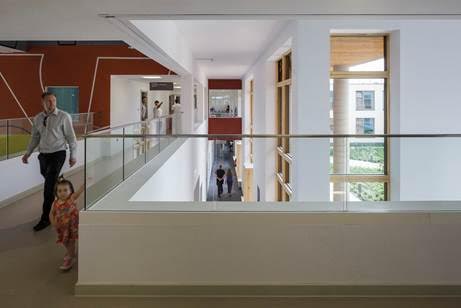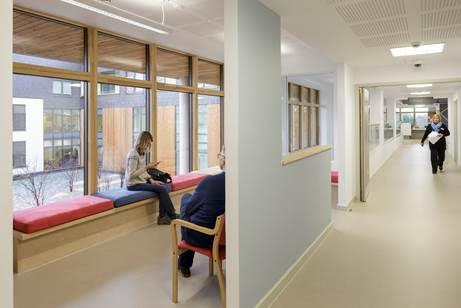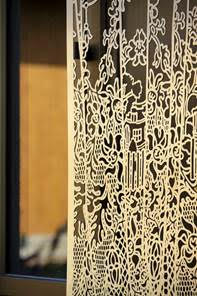Architects Penoyre & Prasad have recently completed a new 8,541sq m local NHS hospital in Welwyn Garden City.
As part of a wider reconfiguration of hospital services in East and North Hertfordshire; the new QEII is one of the first of a new generation of hospitals commissioned to provide key healthcare community services. It replaces the existing district general hospital built in the 1950s, which itself was one of the first purpose-built NHS hospitals in the UK.
Six decades later, as part of NHS reforms such as the Five Year Forward View, this new type of hospital bridges the gap between primary care and acute or specialist hospitals. The New QEII Hospital efficiently provides a range of integrated care functions closer to home, to the benefit of patients, service providers and the health economy.
The New QEII Hospital is designed around a landscaped courtyard and clad in timber, hand glazed tiles and render. The light and airy building responds sympathetically to its leafy Garden City context. Penoyre & Prasad specified natural materials whenever possible.
The New QEII Hospital provides outstanding medical and patient facilities for the local area, who are welcomed in the reception area by a bold and colourful mural by celebrated artist, David Tremlett.
The Urgent Care Centre at the New QEII Hospital operates 24/7, but there are no inpatient beds for overnight stays as the hospital concentrates on day care and outpatient treatments. To support specialist acute regional hospitals, such as the Lister in Stevenage; the New QEII Hospital provides a wide and comprehensive range of clinical services including diagnostics, treatment, and therapies, closer to the community it serves.
The scale and layout of the building is not large or complex, and the layout and organisation of departments is clear and understandable, allowing the hospital to be easily navigated externally and internally, a key feature in improving the patient experience.
The main waiting areas are located adjacent to the central courtyard, which provides natural light and garden views. The wide corridors open on both sides to treatment rooms, and corridors end with a window to gardens or courtyard, creating a feeling of openness. There are eight main waiting areas throughout the building, as well as a number of smaller informal waiting spaces and window seats with views onto the courtyard. The courtyard garden can be accessed through multiple doors.
Tracy Byrne, one of the nurse practitioners who works in the Urgent Care Centre said: “It’s an exciting start for the New QEII. The building has a great open feeling with natural light, which is fantastic and will really help patient care.”
Dr Asha Herbert added: “It’s a lovely open, airy, fresh department which I’m sure staff and patients will benefit from.”

Circulation and wayfinding on the ground and first floors have been carefully considered
Visitors navigate the building using a colour palette derived from the Tremlett artwork, which has been extended out into the building as part of the wayfinding and interior design. Penoyre & Prasad wanted to move beyond traditional institutional NHS signage, which is not always helpful to people with no medical vocabulary. Each lift and stair core, as well as associated departments, are assigned a colour palette from one of the bold colours of the mural so patients can easily identify where they are. In collaboration with the client teams, Penoyre & Prasad also broke away from descriptions like phlebotomy and chose instead ‘Blood Testing’, clearly written in an attractive graphic.
Penoyre & Prasad was tasked with developing a flexible sustainable building by local NHS commissioners. As such the team was keen to avoid a deep-plan solution. Instead they designed a building plan comprising three ‘L’ shapes that interconnect to create the central courtyard and gardens. Each L accommodates up to two hospital departments, and the hinge of each L has a lift and stair core, shared with the interconnecting ‘L’.
Externally a generous timber-clad colonnaded entrance provides a protected arrival space and allows the landscape to flow through the triple-height foyer to the courtyard, creating a sense of openness on arrival. The main elevations are clad in hand-glazed ceramic tiles. This is the first use of this kind of tile on a hospital building.
Careful consideration has been given to the scale and form of the new hospital. The pitched form of the roof responds to the garden city context. The two-storey wings respect the existing domestic scale of neighbouring properties, but the building rises to four storeys under a gently-sloping monopitch roof, clad in zinc coated aluminium standing seam roofing. As the building rises up, the colonnades cut under the solidity of the tiled elevations, revealing the timber lined walls and soffit of these protected walkways.

Informal waiting areas with views onto courtyard are dotted around the building
In keeping with the new building’s focus on art and a garden environment, the opening windows on the first, second and third-floor windows are protected by laser-cut metal screens featuring a delicate locally influenced ‘tracery’ by artist Charlotte Mann, instead of the usual security bars.
Richard Aston, principal major developments officer for Welwyn Hatfield Borough Council, said: “I was at the hospital this morning for an appointment and having not seen the building for a while I was very impressed with the building, in particular the juxtaposition of the materials. I think it is a fantastic addition to what can often be a limited architectural vernacular within the town.”
The development was commissioned by Assemble Community Partnership on behalf of East and North Hertfordshire CCG and East and North Hertfordshire NHS Trust. It was built by Balfour Beatty, with AECOM as structural engineers and Tropus & Spicer as quantity surveyors. Building Services Design provided M&E engineering expertise.

Stainless steel window screen detail has been designed by artist, Charlotte Mann




